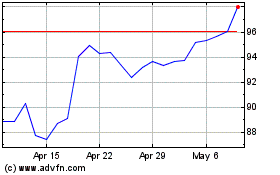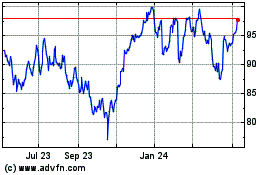L'Oréal Applies Digital Makeover to Sales Efforts
11 November 2020 - 9:40AM
Dow Jones News
By Sara Castellanos
L'Oréal SA is attracting new customers and making new sales
through e-commerce initiatives it has recently spearheaded to
mitigate the effects of bricks-and-mortar store closures due to the
coronavirus pandemic.
The French cosmetics company has launched new online beauty
tutorials and created a way for beauty advisers to apply makeup
virtually on prospective customers, mimicking the in-store
consultation experience, among other e-commerce initiatives.
"The pandemic has accelerated our e-commerce transformation,"
said Lubomira Rochet, the French cosmetic company's chief digital
officer. L'Oréal's brands include Lancôme, Kiehl's, La Roche-Posay
and Maybelline New York.
Overall, the beauty industry has been hit hard by store closures
this year. Beauty industry sales in the U.S. between January and
September were down by 23% to $10.3 billion compared with the same
period last year, according to market research firm NPD Group.
But the industry's online sales have generally been
accelerating, with double-digit growth in U.S. online sales for
fragrances, makeup and skin care, according to NPD. The shift is
partly due to the industry's embrace of new concepts and
cutting-edge technologies such as augmented reality, said Larissa
Jensen, vice president and beauty industry adviser at the market
research firm. "All of these things were on everyone's radar, but
2020 just accelerated everything," Ms. Jensen said.
L'Oreal doubled down on several of its cutting-edge tech
efforts, developing two new online services, including one devoted
to re-creating the in-store beauty consultation experience, in less
than four weeks. The efforts would have normally taken about three
months each, Ms. Rochet said.
One service was a way for customers to connect with beauty
advisers virtually, through augmented reality technology from
ModiFace, a company that L'Oréal acquired in 2018 for an
undisclosed amount. The beauty expert can meet for a
tele-consultation via mobile app and virtually apply makeup to a
customer's face in real-time.
The ModiFace technology has also been available since last year
through websites of retailers such as Amazon.com Inc. and LVMH Moët
Hennessy Louis Vuitton SE's Sephora, where customers can virtually
"try on" products before they buy.
During the pandemic, L'Oréal's virtual try-on usage has
multiplied by five times, reaching 1 billion user visits, Ms.
Rochet said. Conversion rates from virtual try-ons -- the rates at
which browsers turn into buyers -- have tripled during the
pandemic, with people spending more than seven minutes on the
service and trying between 20 to 30 shades of makeup before they
buy, Ms. Rochet said.
The digital team also developed a way for social media
influencers, beauty advisers and L'Oréal brand experts to host
live-streaming beauty tutorials and master classes on products such
as makeup and fragrances, directly through L'Oréal's websites.
The company hosted 1,000 live-streaming sessions in five weeks
over the summer, attracting about 80 million viewers outside of
China, where live-streaming has already been popular, Ms. Rochet
said. People spent up to 45 minutes on average watching those
live-streaming tutorials, with conversion rates of up to 11% and
online shopping basket sizes of more than $95, Ms. Rochet said.
So far, L'Oréal's efforts appear to be paying off. E-commerce
sales represented about 24% of total sales between January through
September, up from about 13.5% during the same period last year.
Total sales for the period were 20.11 billion euros (about $23.8
billion), down 8.6% from the 21.99 billion euros reported in the
same period of 2019. E-commerce is expected to represent about half
of total sales within the next several years, Ms. Rochet said.
L'Oréal's e-commerce efforts aren't only aimed at boosting
online sales for real-life beauty products but also at making
digital replicas of them for videogame enthusiasts.
L'Oréal's digital team has developed virtual hair colors and
makeup looks that gamers can "wear" while they are gaming, similar
to the way augmented reality-based filters work on Instagram.
Gamers can also have their avatars wear the products. Ms. Rochet
declined to disclose metrics on the gaming efforts.
"We have to think of gaming as a new marketing channel," Ms.
Rochet said.
L'Oréal is also teaming up with social media influencers on
Amazon.com's Twitch, a live-streaming platform that has grown even
more popular among videogamers during the pandemic. The influencers
review and talk about L'Oréal products while they are playing games
on the platform.
Within the next five years, L'Oréal's Ms. Rochet predicts that a
new area of growth in e-commerce will be "retailtainment," a
combination of retail and entertainment, which includes
live-streaming, gaming and esports.
Write to Sara Castellanos at sara.castellanos@wsj.com
(END) Dow Jones Newswires
November 10, 2020 17:25 ET (22:25 GMT)
Copyright (c) 2020 Dow Jones & Company, Inc.
Loreal (PK) (USOTC:LRLCY)
Historical Stock Chart
From Dec 2024 to Jan 2025

Loreal (PK) (USOTC:LRLCY)
Historical Stock Chart
From Jan 2024 to Jan 2025
